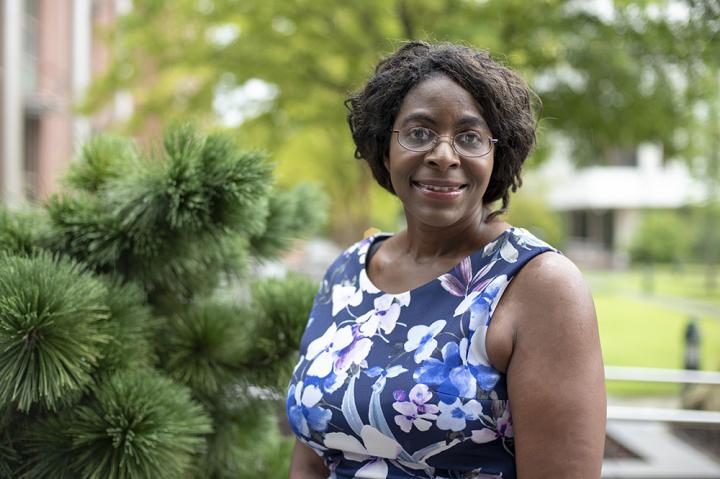Researchers at the Hollings Cancer Center at the Medical University of South Carolina lead health disparity research studies

Credit: MUSC HCC
Leading health disparities experts hope health institutions will take advantage of a new cancer health equity research volume recently released that curates the latest developments in how researchers can best address health disparities so all patients receive good quality care.
“This volume is important because it uses a health equity approach to focus on factors associated with cancer disparities research, and it identifies potential solutions to those disparities,” said Marvella Ford, Ph.D., professor of Public Health Sciences and associate director of population sciences and cancer disparities at the Hollings Cancer Center at the Medical University of South Carolina. “It brings together a spectrum of research from the basic sciences to the population sciences to address cancer health equity.”
Ford also is the SmartState Endowed Chair of Cancer Health Equity Research at South Carolina State University. She coedited the volume with Nestor F. Esnaola, M.D., of Houston Methodist, and Judith D. Salley, Ph.D., of South Carolina State University. Two of Ford’s studies were included in the recently released book, which is the edited journal volume, Cancer Health Equity Research (Volume 146 -Advances in Cancer Research).
Chapters three, four, six and seven of the volume represent Hollings’ studies by Ford and other colleagues. She also wrote the preface in Health Equity Research. The journal includes research that highlights the importance of including diverse populations in cancer research and suggestions for effective recruitment strategies. These studies are what Ford hopes will lead to better health outcomes for cancer patients, especially those who are disproportionately affected by cancer.
“Researchers can take this information, and they can design and implement their own interventions to reduce cancer disparities and promote cancer health equity,” Ford said.
Studies in the book reveal how better solutions can be found. One of the studies is part of Ford and Salley’s National Cancer Institute U54 PACHE or Partnerships to Advance Cancer Health Equity program and ties to the South Carolina Cancer Disparities Center grant. This research shows the impact of lifestyle on breast cancer risk. The study, originally published in Advances in Cancer Research, found that known breast cancer risks such as a higher body mass index, lower rates of physical activity and a type of cancer called hormone receptor-negative breast cancer appear to be more prevalent in African Americans without Sea Island/Gullah ancestry than in Sea Islanders.
Her other study published in Advances in Cancer Research, led by Hollings Cancer Center researcher David P. Turner, Ph.D., showed that mammary gland development is linked to breast cancer disparity, perhaps mediated through socioeconomic status and childbearing patterns, such as the age at which a young woman starts menstruating.
Ford said the newly released volume is important because these studies help researchers to pinpoint areas where specific health interventions could be developed.
“Cancer disparities are a major public health problem in the United States. The goal of cancer disparities research is ultimately to reduce and eliminate these disparities,” Ford said. “The synergy among the chapters is shown by their emphasis on the multiple factors that contribute to cancer disparities, ranging from social factors to biological factors.”
###
About MUSC
Founded in 1824 in Charleston, MUSC is the oldest medical school in the South, as well as the state’s only integrated, academic health sciences center with a unique charge to serve the state through education, research and patient care. Each year, MUSC educates and trains more than 3,000 students and 700 residents in six colleges: Dental Medicine, Graduate Studies, Health Professions, Medicine, Nursing and Pharmacy. The state’s leader in obtaining biomedical research funds, in fiscal year 2018, MUSC set a new high, bringing in more than $276.5 million. For information on academic programs, visit http://musc.
As the clinical health system of the Medical University of South Carolina, MUSC Health is dedicated to delivering the highest quality patient care available, while training generations of competent, compassionate health care providers to serve the people of South Carolina and beyond. Comprising some 1,600 beds, more than 100 outreach sites, the MUSC College of Medicine, the physicians’ practice plan, and nearly 275 telehealth locations, MUSC Health owns and operates eight hospitals situated in Charleston, Chester, Florence, Lancaster and Marion counties. In 2019, for the fifth consecutive year, U.S. News & World Report named MUSC Health the number one hospital in South Carolina. To learn more about clinical patient services, visit http://muschealth.
MUSC and its affiliates have collective annual budgets of $3 billion. The more than 17,000 MUSC team members include world-class faculty, physicians, specialty providers
About Hollings Cancer Center
The Hollings Cancer Center at the Medical University of South Carolina is a National Cancer Institute-designated cancer center and the largest academic-based cancer research program in South Carolina. The cancer center comprises more than 100 faculty cancer scientists and 20 academic departments. It has an annual research funding portfolio of more than $44 million and a dedication to reducing the cancer burden in South Carolina. Hollings offers state-of-the-art diagnostic capabilities, therapies and surgical techniques within multidisciplinary clinics that include surgeons, medical oncologists, radiation therapists, radiologists, pathologists, psychologists and other specialists equipped for the full range of cancer care, including more than 200 clinical trials. For more information, visit http://www.
Media Contact
Dawn Brazell
[email protected]
Original Source
https:/
Related Journal Article
http://dx.




